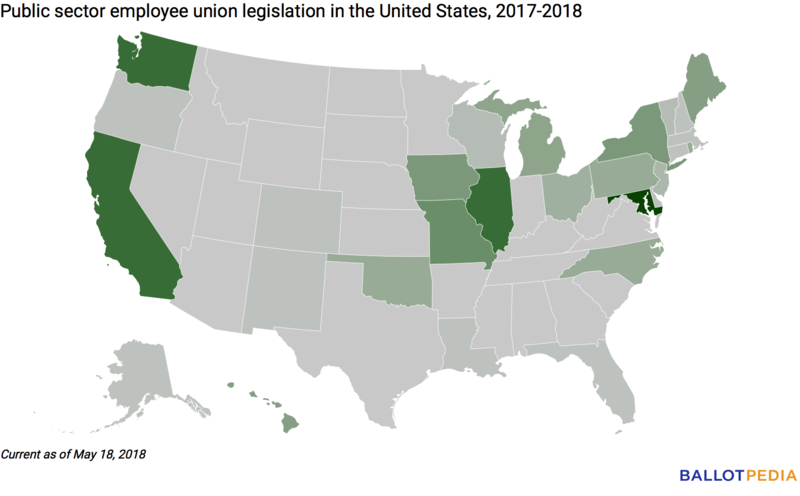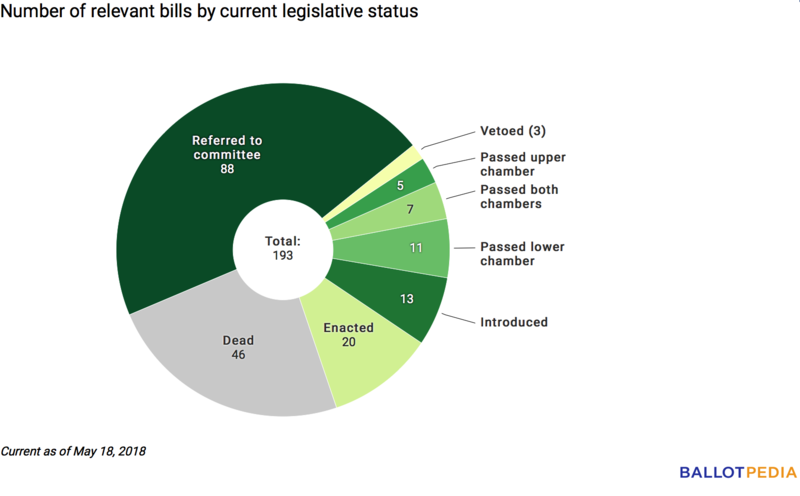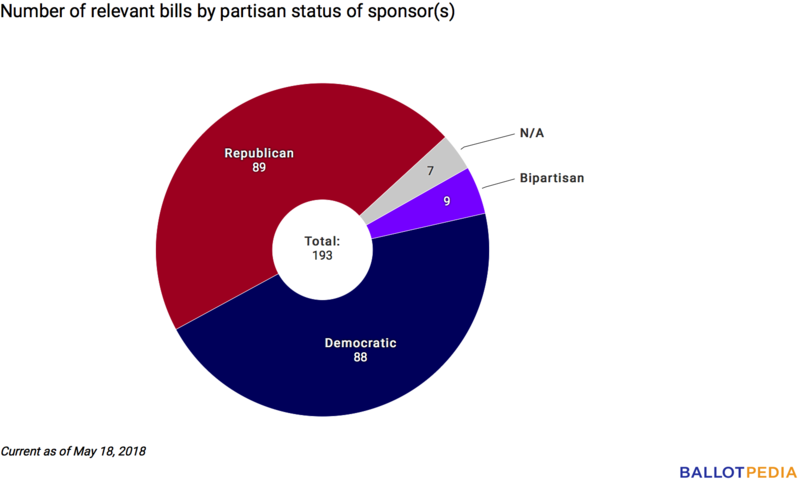Union Station: May 18, 2018
According to the Bureau of Labor Statistics, unions represented nearly 8 million public sector workers in 2017 -- 37.9 percent of the total public sector workforce. Of this total, 7.2 million were union members; the remaining employees were non-members represented by unions. Conversely, unions represented 7.3 percent of private sector workers. The high rate of public sector unionization gives those unions considerable political influence at the local, state, and federal levels.[1]
The Supreme Court of the United States is poised to issue a decision in Janus v. American Federation of State, County, and Municipal Employees (Janus v. AFSCME), a case challenging the constitutionality of public sector employee union agency fees (i.e., fees required of non-members to cover the costs of non-political union activities).
Agency fee opponents say requiring such fees violates individual worker’s First Amendment associational rights. Fee proponents argue they are necessary to support the costs associated with representing non-members.
In anticipation of this ruling, state legislatures have begun considering bills relating to public sector employee unions. In this newsletter, Ballotpedia will track those bills, highlight national legislative trends, and provide a sampling of commentary surrounding the subject.
What people are saying
In opposition to Janus:
| “ | The U.S. Supreme Court will issue a decision on the Janus v. AFSCME case, which is part of the 'right-to-work' agenda.
For people not familiar with 'right-to-work,' it is a misnomer; it isn’t about the right to hold a job, work for a fair living and support your family. Instead, it is about the right to work for a company that wants to pay you less for the same amount of work done each day, if not more. It is about stripping away the rights of being a card-carrying union member. It is a chance for the big corporations to take away your right to be able to bargain collectively for fair wages, benefits, vacation and sick days. These big corporations would have you believe that union fees that are collected from non-members are used to fund political campaigns, which is untrue. There are separate voluntary contributions from members that fund the union’s political efforts.[2] |
” |
| —Dona Baxter, in an op-ed for The Pittsburgh Post-Gazette (May 7, 2018) | ||
In favor of Janus:
| “ | The freedom to choose or deny services and representation is a concept as old as our country – and why the First Amendment guarantees the right of every citizen to associate freely. Teachers, who are charged with passing on our nation’s principles to our youth, should be free to embody the concept of freedom to associate.
As we celebrate Teacher Appreciation Week, one way we should recognize the critical value of teachers is by supporting their right to choose whether or not to join a union. We rightly entrust teachers with our future, we can trust them to decide which professional association has earned their money. Teachers deserve options, and forcing everyone into a union denies their ability to decide what is best for them, their profession, and their students. Appreciating teachers means respecting their choices, union and non-union alike.[2] |
” |
| —Colin Sharkey, in an op-ed for The Hill (May 11, 2018) | ||
The big picture
Number of relevant bills by state
As of May 18, 2018, we have tracked 193 pieces of current legislation dealing with public sector employee union policy. On the map below, a darker shade of green indicates a greater number of relevant bills. Click the map for complete information.
Number of relevant bills by current legislative status
Number of relevant bills by partisan status of sponsor(s)
Recent legislative actions
Since last week, the following major legislative actions occurred:
- Two bills were enacted
- Four bills cleared a lower chamber
- One bill cleared an upper chamber
- California: SB1085
- One bill died
- Kansas: HB2401
Below is a complete list of actions taken by legislatures on relevant bills over the course of the past week. Bills are listed in alphabetical order, first by state and then by bill number. Note that some action dates may have occurred more than a week ago. This is due to the fact that state-specific legislative tracking mechanisms are sometimes not updated in real-time.
- California AB1937: This will would "authorize employee organizations [for employees of the Regents of the University of California, the Judicial council, counties, cities, and public authorities, including transit districts] and bona fide associates to request payroll deductions and would require public employers to honor these requests."
- On May 16, 2018, the Assembly Appropriations Committee referred this bill to the suspense file, meaning that the bill was set aside but could be heard at a later date.
- California AB2049: This bill would authorize school districts and community colleges to rely on labor unions when determining whether a request to discontinue payroll deductions for union dues is in conformity with the requirements established in the initial payroll deduction authorization.
- On May 16, 2018, the bill was heard by the Assembly Appropriations Committee and referred to the suspense file.
- California AB2886: This bill would "require employers and employees of the Orange County Transit District to adjudicate complaints of specific labor violations before [the Public Employment Relations Board (PERB)] as an unfair practice and would authorize specified parties aggrieved by PERB's decision or order to petition for relief from that decision or order."
- On May 10, 2018, the bill cleared the California State Assembly and moved to the California State Senate, where it was referred to the Committee on Rules.
- California AB3034: This bill would grant employees within supervisory units of the San Francisco Bay Area Rapid Transit District the right to form employee organizations.
- On May 10, 2018, the bill cleared the California State Assembly and moved to the California State Senate, where it was referred to the Committee on Rules.
- California SB1085: This bill would require public employers "to grant reasonable leaves of absence without loss of compensation or other benefits for the purpose of enabling employees to serve as stewards or officers" of an employee organization.
- On May 10, 2018, this bill cleared the California State Senate and moved to the California State Assembly, where it was held at the desk.
- Illinois SB2838: This bill would prohibit a school district from using a recruiting firm to hire substitute teachers in the event of a teachers' strike. This bill would also permit a substitute teacher recruiting firm to enter into an agreement with a labor organization that has a collective bargaining agreement with a school district.
- On May 16, 2018, the bill was reported favorably by the Elementary and Secondary Education: Licensing, Administration, and Oversight.
- Kansas HB2401: This bill would prohibit payroll deductions from a union member's paycheck "for the purpose of engaging in partisan or political purposes." The bill would also require unions to form specific funds for political expenditures.
- On May 4, 2018, the bill was reported as having died in committee.
- Maryland HB284: This bill changes which deputy sheriffs have the right to form unions and collectively bargain with the Sheriff and Cecil County Executive.
- On May 15, 2018, this bill was signed into law by the governor.
- Maryland SB73: This bill provides that full-time deputy sheriffs and correctional officers at the rank of captain or below in Harford County have the right to form unions and collectively bargain with the Sheriff and Harford County Executive.
- On May 15, 2018, this bill was signed into law.
- Missouri HB1413: This bill would prohibit payroll deductions for union dues, agency fees, or other union fees except by annual written or electronic authorization by an employee.
- On May 17, 2018, this bill cleared the Missouri House of Representatives. The bill cleared the Missouri State Senate the prior day.
- Missouri HJR79: This bill proposes a constitutional amendment that would prohibit employers from requiring employees to join a union or pay dues to a union.
- On May 14, 2018, this bill cleared the Missouri House of Representatives and moved to the Missouri State Senate.
- New Jersey A3686: This omnibus bill requires, among other things, "public employers to provide exclusive representative employee organizations with access to members of the negotiation units. ... The bill specifies that home addresses, phone numbers, email addresses, birth dates, employee negotiation units and groupings, and communications between employee organizations and their members, prospective members, and non-members, are not government records and are exempt from the disclosure requirements of P.L.1963, c.73."
- On May 18, 2018, Governor Phil Murphy (D) signed this bill into law.
- New York A05694: This bill would rescind a requirement that public employers continue the terms of an expired collective bargaining agreement until a new agreement is reached with an employee organization.
- On May 15, 2018, this bill was reported as being held for consideration by the Committee on Government Employees.
See also
| |||||||||||||||||||||||
- ↑ Bureau of Labor Statistics, "Union Members — 2017," January 19, 2018
- ↑ 2.0 2.1 Note: This text is quoted verbatim from the original source. Any inconsistencies are attributable to the original source.





